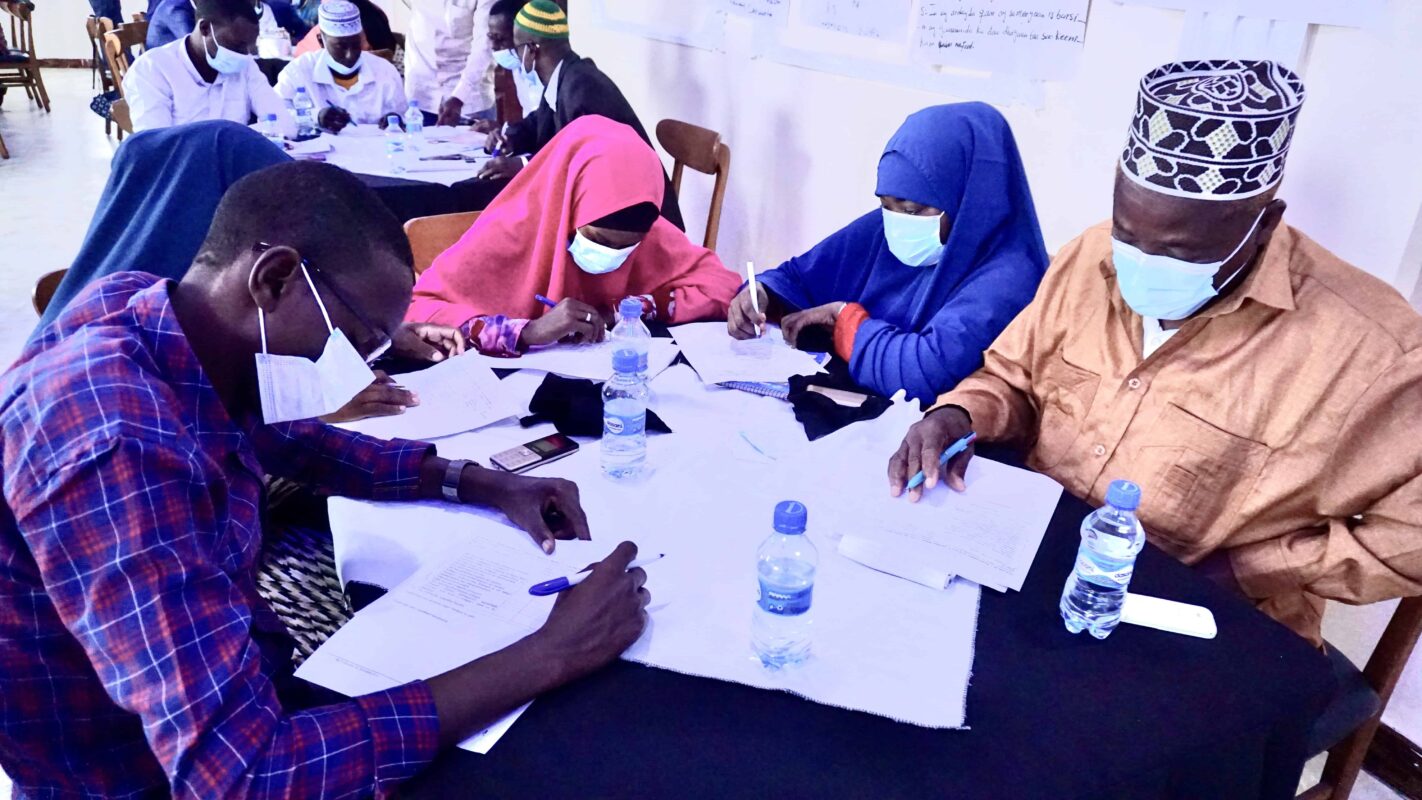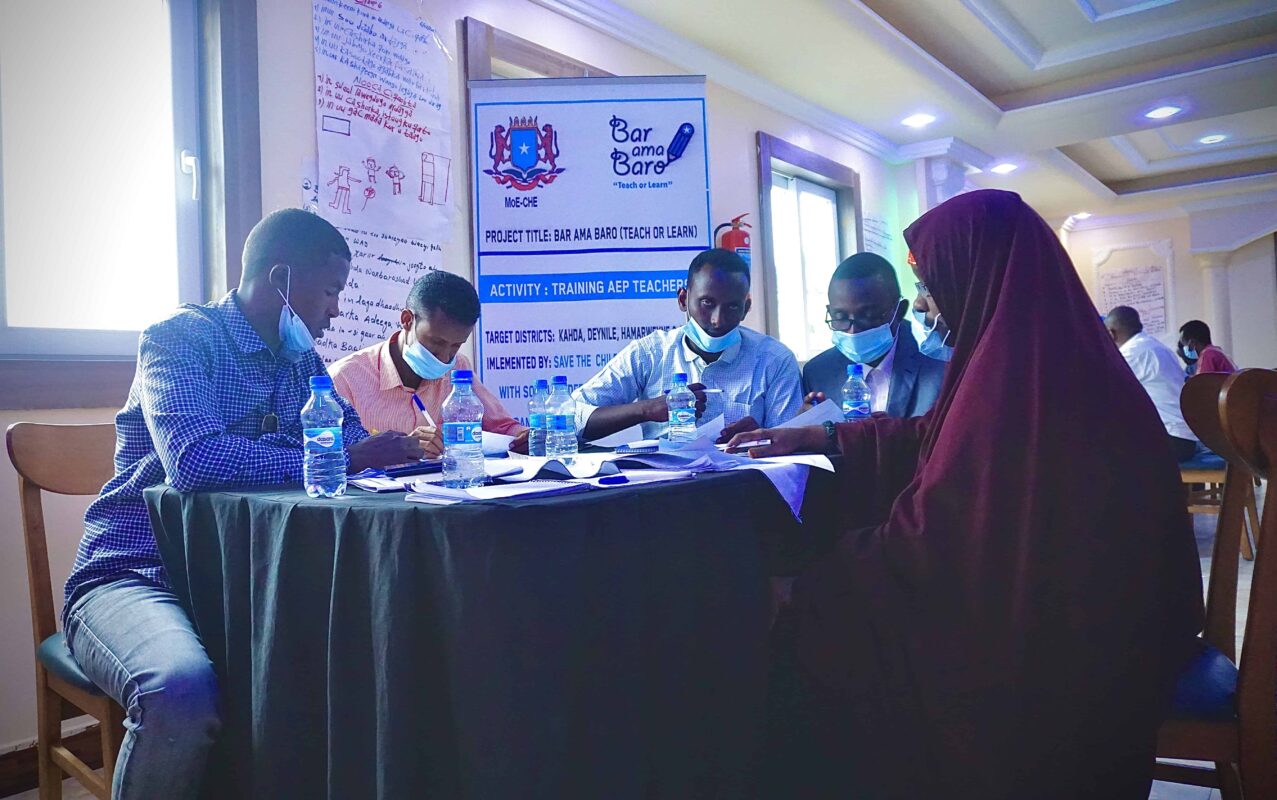The Bar ama Baro program targets over 100,000 of out-of-school Somalian children ages 9 to 16. A new advanced learning curriculum will be introduced in nearly 190 BAB schoolswhen studentsstart en August. Prior to the curriculum’s debut, más que 750 instructors completed a training last month to learn teaching strategies and curriculum for students who may be behind in school.
un maestro, Muhsin Abdullahi Aden, dice that he’s eager that the program is reaching out specifically to students who need support with getting on track.
“The program is much needed in Somalia as there is large number of out-of-school children due to many circumstances. This program provides educational opportunities to children who desperately need education, and my community is already excited about it,” says Aden.

ElBar ama Baro program (Enseñar o aprender) is a five-year primary education program that implements accelerated education curricula to bring más que 100,000 Somalian out-of-school children up to speed; many will be attending school for the first time ever.
Out-of-school youth can be years behind students with a traditional educational experience.
The education program, funded by the U.S. Agency for International Development supports the government of Somalia’s education efforts by openingacceleratedbasicmiducation schools, as well as informing instructors about inclusive teaching methods like socioemotional learning and intelligence types such as linguistic, kinesthetic and visual.
The primary education program targets out-of-school9 a 16 años in 188 schools across 11 districts in Somalia andensures that youth, independientemente de la marginación, podrán acceder de manera equitativa, seguro, educación sensible al conflicto.
Bar ama Baro program leaders are working alongside theMinisterio de Educación, Cultura, y educación superior and other Somalian education leaders to develop the accelerated basic education curriculum, textbooks, teaching guides and other education materials.
Students who join the program will begin at one of two levels that combine instructional material from two typically separate grade levels. Por ejemplo, Nivel 1 students will study subjects that traditionally students learn during Grades 1 and 2. Each level is equivalent to two grades in formal Somalian education.
Teachers have begun a Bar ama Baro student assessment that will indicate students’ eligibility to enroll into fast-tracked schools and the level that students will start. Classes begin at the end of August.
Prior to the debut of Bar ama Baro’s inaugural school year, 754 teachers from the 11 districts came together en their respective districts duranteJune andJuly for a week-long training to master Bar ama Baro’s accelerated basic education material and teaching methodologies that will improve instruction.
También, teachers learned new skills about classroom management, preparing lesson plans and evaluating learning outcomes.
Hani Mustaf Hassan says that themaestrotrainings further developed her skillset and allowed her to gain confidence as a woman-instructor as well.

“I gained a lot of knowledge regarding how to teach the accelerated basicmiducation curriculum effectively and manage classes,” says Hassan. “In Somalia, teaching is often viewed as men’s responsibility and as a result the number of female teachers in the whole country is quite small.”
She adds that by being a competent instructor it will “in turn lead to more girls attending school” and ultimately by“girls being educated, it can contribute to the overall development of our country.”
About a third ofBar ama Baro teaching staff are either female, from marginalized groups or individuals with disabilities.
Now instructors have the proper training to support students who are from socially marginalized groups.
Elteacher trainings were led by partners includingRed de Educación Formal para Escuelas Privadas, Asociación de Ayuda y Desarrollo de Himilo, Save the Children andAcademia Hano.
Todocapacitación workshops were designed by Bar ama BaroSenior Reading Advisor, Diyat Abdi. He also trained 30 workshop facilitators from the partner organizations, como el regional and districtMinistries of Education and Ministry of Education, Cultura, and Higher Education.
El 30 facilitators will continue to lead trainings, coach, observe and provide feedback to all 754 teachers throughout the school year.
Throughout the program, Barra o Bar facilitators will work with the Somalian government and educational stakeholders to improve curriculum and guide teachers to ensure that children are receiving an equitable, quality education regardless of their classroom experience.
Aja Beckham contributed to this article.